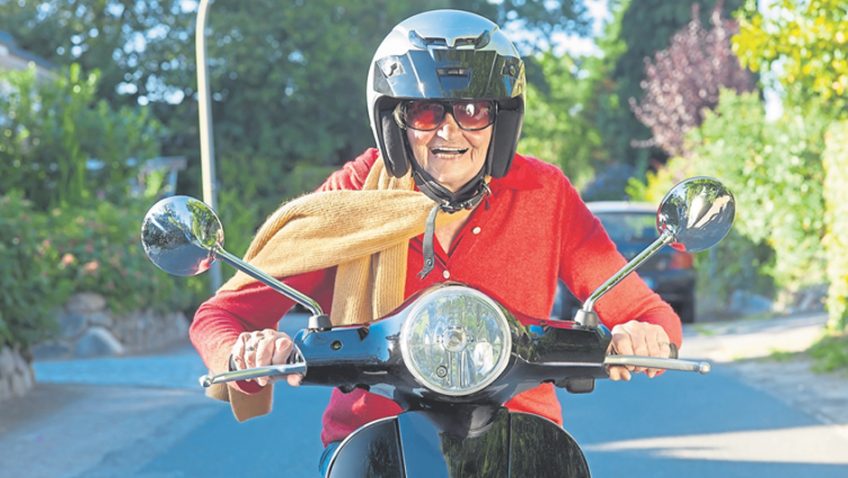A recent survey by One Family, a finance company, has conducted research into the UK’s perception of age – speaking to those aged 5 to over 90. After surveying 1,129 participants and speaking, face-to-face, with people of various ages they discovered that being an ‘adult’ certainly means more than the dictionary definition of ‘a person who is fully grown or developed.
The research reveals that 33 is the average age in which Brits feel they are a ‘grown-up’, and almost double that until they become ‘old’ – 62. Despite this, over a third (34%) of adults do not feel ‘grown-up’ at all.
Interestingly, more 19-25 year olds (54%) feel ‘grown-up’ compared to 41-50 year olds (47%). And 1 in 10 (11%) 81-90 year olds said they aren’t ‘grown-up’ yet. Perhaps the older we get, the less grown-up we feel?
According to Professor Jayne Raisborough, professor of media from Leeds Beckett University, being old is “to have lived” and to have “survived the rich joys and deep sorrows that make up all our lives.”
Statistics can be used to illustrate most situations but in this case the perception of when someone is old is difficult to pin-down especially as our opinions change as we age ourselves.
To a child someone who has grey hair and glasses is seen as old, especially if they are a grandparent, but as children find the concept of time passing confusing, we should never be offended by being categorised as an old person.
When I’m 64
The general consensus is that once you reach 60 you can be fitted into the old category. More specifically the long-accepted age of retirement at 65 is often used as a milestone in surveys and the age at which a person is considered a pensioner and thus old. The words of the famous Beatles song used 64 as this is easier to rhyme but I wonder how the 74-year-old Sir Paul McCartney feels about the words he wrote 50 years ago:
When I get older losing my hair
Many years from now
Will you still need me
Will you still feed me
When I’m sixty-four?
There are thousands of homilies and wise words about the process of ageing and those of us who are enjoying our later years seek to find the positive. From the early days of philosophy, Cicero wrote his essay On Old Age in 44 BC. It has remained popular because of its profound subject matter as well as its clear and beautiful language. One of the many quotes is “No man is so old that he does not think himself able to live another year.”
Perception of age
An overview of various surveys done in the US and the UK indicates that most adults over 50 feel, on average, at least 10 years younger than their actual ages. One-third of those between 65 and 74 said they felt 10 to 19 years younger, and one-sixth of people 75 and older said they felt 20 years younger.
On average, survey respondents said old age begins at 68. But few people over 65 agreed; they said old age begins at 75. Respondents under 30 said 60 marks the beginning of old age.
Life Expectancy
If you live in Japan where overall life expectancy is about 85 years, then one could assume that old age starts at about 75, whereas in Swaziland which has an expectancy of 49 then you are considered old before 40.
In England, life expectancy for men aged 65 years in 2012 to 2014 was another 18.8 years, while women at this age could expect to live for an additional 21.2 years. This means that a 65-year-old man could expect to live to almost 84 years, while a woman of the same age could expect to reach her 86th birthday. In Wales men and women can expect to reach their 83rd and 85th birthday respectively.
Underlying trends show a general improvement in Scotland over recent years. The most recent annual estimates for Scotland are for boys born in 2014 to live 77.4 years on average, 60.3 of these in a ‘healthy’ state. Girls born in 2014 would be expected to live 81.4 years on average, 62.6 of these years being ‘healthy’.
According to the ONS the proportion of those aged 65 or over increased by 3.8 percentage points between 1974 and 2014, from 13.8% of the UK population to 17.7%. This proportion is projected to increase by a further 6.6 percentage points of the UK population by 2039. This rise in proportion of the population indicates that the UK has an ageing population. This is due to both the existing age structure of the population, where people born in the 1960s’ baby boom are entering older ages, as well as the population living longer.
Act your Age
In our youth oriented society too much emphasis is put on years, 50, 60, 70, 80 etc. instead of the individual and their specific physical and mental characteristics.
There is a freedom that comes with age. For me the poem below by Edward Lear is most appropriate:
“You are old, Father William,” the young man said,
“And your hair has become very white;
And yet you incessantly stand on your head –
Do you think, at your age, it is right?”
“In my youth,” Father William replied to his son,
“I feared it might injure the brain;
But, now that I’m perfectly sure I have none,
Why, I do it again and again.”
Do we make assumptions about people based solely on their age? Common generalisations include driving ability, physical slowness and a stubborn view.
We are very interested to know when you think old age begins. Is there such a state?
By Christine Parkinson




